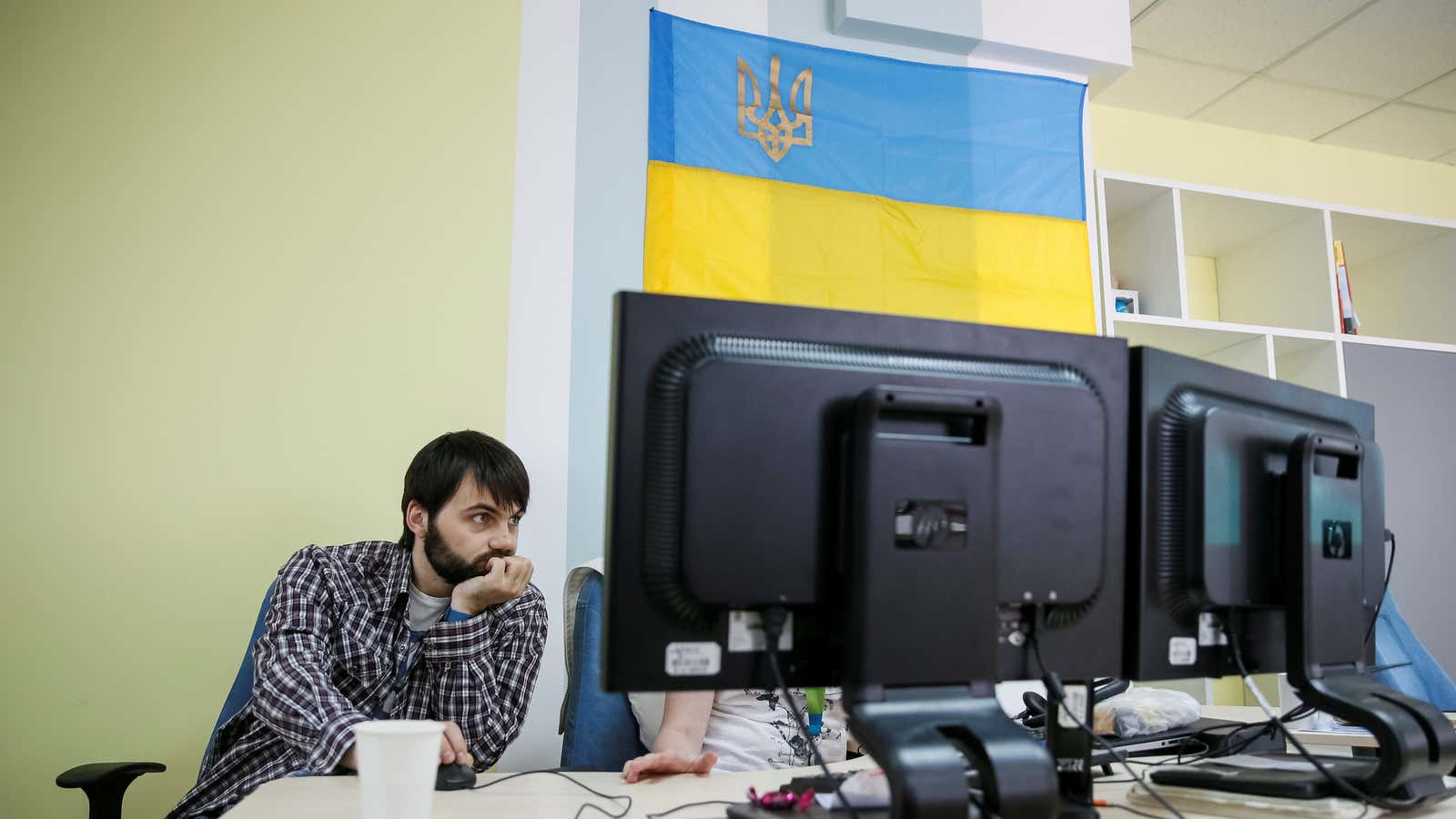Kharkiv is Ukraine’s second-most-populous city and home to its thriving $6.8 billion tech sector. In September 2021, it housed more than 500 tech companies, and the industry had grown more than 50% in two years.
Today, Kharkiv, a city of 1.5 million people just 45km (25 mi) from the Russian border, is also among the most vulnerable as Russia bears down on the country. Downtown buildings stand in piles of rubble after Russian airstrikes, and thousands have fled. By mid-February, many tech companies were already evacuating their workers from Ukraine as Russia prepared to invade. The Israeli website builder Wix offered to evacuate 1,000 of its Ukrainian staff and their families to Turkey. Cimpress, which sells customized goods, made a similar offer to its 500 IT workers in Ukraine, as did the edtech firm Canvas.
With Russia stepping up its attacks against civilians in Ukraine’s biggest tech hub, the IT sector may never come back. “If the war ended tomorrow, most people would be happy to go back,” says Vlad Panchenko, CEO of the Ukrainian metaverse developer DMarket, who spoke from Montenegro after chartering a plane to fly nearly all of his 100 employees from Kyiv on Feb. 18. “But if Russia wins the war and invades the whole country, no one will come back. I’ve seen what Russia did in the eastern Ukrainian regions and in Crimea as well. You can’t do any business over there. It’s always scorched earth.”
Ukraine’s booming tech sector
The tech sector has been a bright spot in the Ukrainian economy, creating high-paying jobs and attracting hundreds of millions of dollars in foreign investment. It has defied the country’s troubles starting with the Russian invasion of Crimea in 2014, then a devastating Russian cyberattack known as NotPetya in 2017, and the coronavirus pandemic. When Ukraine’s GDP fell 4.4% in 2020, revenue from Ukraine’s outsourced IT services grew more than 20%. That year, tech startups raised a record $571 million, according to the Ukrainian investment firm AVentures Capital.
Most of the industry still revolves around providing outsourced labor for US and European tech companies, but lately, Ukrainian founders have launched several of their own billion-dollar startups, including software developer GitLab and the grammar-checking plug-in Grammarly. The country now has roughly 5,000 IT companies, including some 1,400 startups, and 285,000 people working in the field, according to the IT Ukraine Association. Many of these companies specialize in products for e-commerce, fintech, and healthcare, although that are firms engaged in gaming, logistics, and education.
Ukraine’s tech industry in exile
Trouble for Ukraine’s tech sector has been looming since Russia escalated its attacks on the country. Tech companies began to flee in the wake of the 2014 Crimea invasion. One of Ukraine’s biggest game studios, 4A, relocated to Malta. “Dear motherland, this morning we’re leaving you for some time,” 4A founder Andrew Prokhorov wrote in an open letter in 2014 . “Not because we don’t love you, but because we have to—otherwise 4A Games will cease to exist—it’s really hard to get investors while we’re at war with [Putin].”
Many more tech firms are now likely to relocate amid the latest Russian assaults. This time, the move could be permanent. Panchenko, the DMarket CEO, said his company will be working out of Montenegro for at least two months, but he won’t go back to Ukraine if Russia takes over. He said he has friends who have already decided to permanently move their tech companies to Spain, Portugal, and Turkey.
The consequences could be even more dire for Ukrainian tech workers employed as outsourced labor by Western tech companies. Their jobs may soon be replaced by workers in more stable countries. “At the moment everything started, they just shut down the offices, wiped the computers remotely, and that’s it,” Panchenko said. “I know tons of people lost their jobs.”
